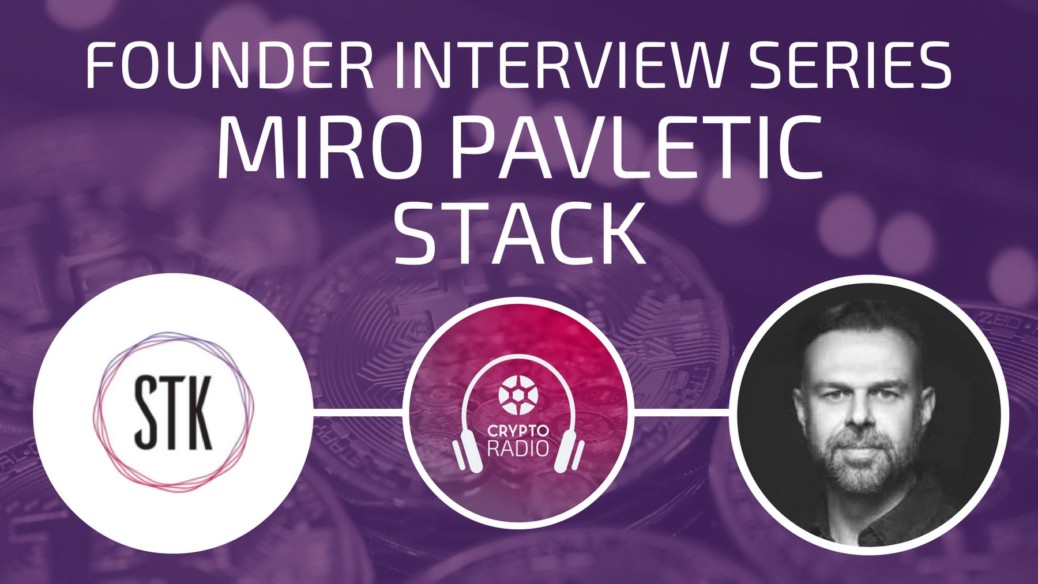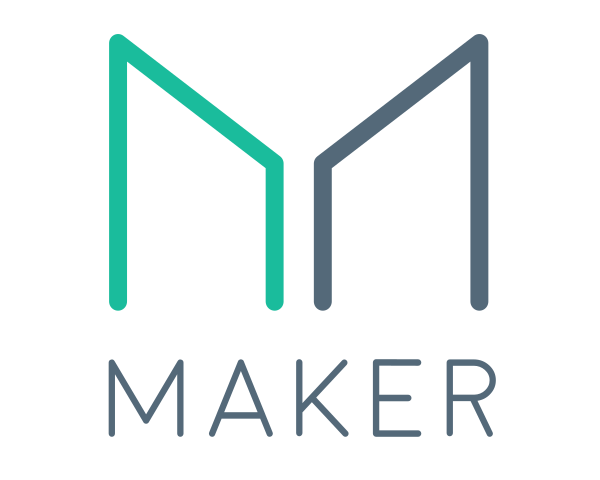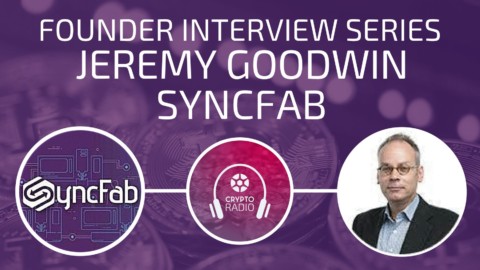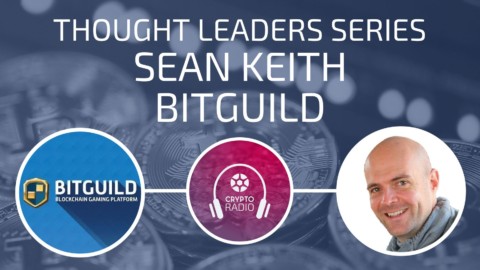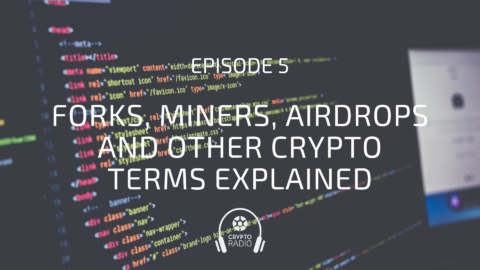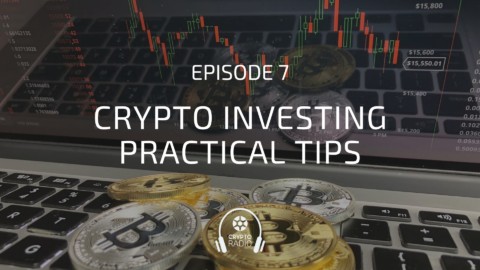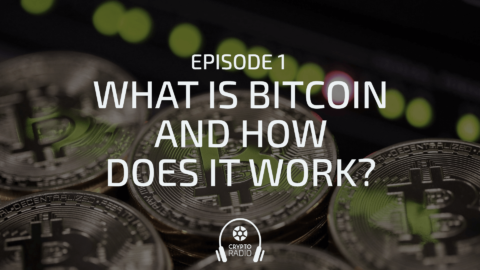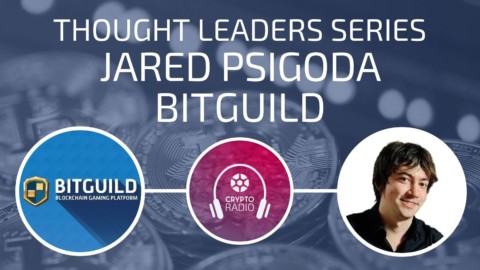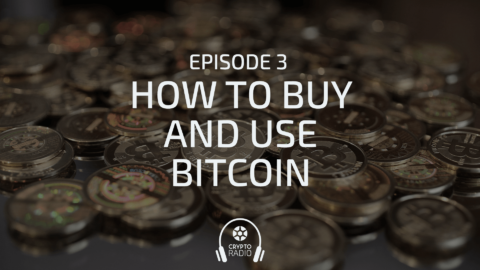Podcast: Play in new window | Download
Euvie: Hi crypto world, I’m Euvie Ivanova. Today in the founders series we have Miro Pavletic, the founder of Stack and STK token. Stack is a digital wallet that uses the STK token and allows users to transact instantly through existing points of sale around the world, making it easy to use cryptocurrency for everyday expenses like buying coffee or going out for dinner with friends. They’re using state channels to make this happen and they’re also looking to implement the DAI stable coin for MakerDAO. [00:00:30] Their goal is to enable average people to make everyday cryptocurrency payments instantly, cheaply, and conveniently.
To get the links and show notes from this episode go to cryptoradio.io/stack. This episode is brought to you by MakerDAO, a decentralized autonomous organization that creates and backs the DAI stable coin on the Ethereum blockchain. DAI is available for purchase on several decentralized exchanges such as OasisDEX and Paradex. For more information about how DAI works, [00:01:00] go to cryptoradio.io/maker.
Mike: Welcome to Crypto Radio. We interview the top thinkers and entrepreneurs in the blockchain and cryptocurrency industry. We also cover topics like trading, investing, and ICOs. We’re your hosts Mike Gilliland, Michael Paul, Chris Sparks, and Euvie Ivanova. We’re entrepreneurs, crypto investors, and co-founders of a new blockchain investment platform called cosyndicate.io. We created Cosyndicate and Crypto Radio to make crypto investing a better experience for you. [00:01:30] If you’re new to the show and you’d like a list of our top episodes and resources, go to cryptoradio.io/start. If you like our podcast, you can subscribe, share, and follow us on social media, and leave us a rating and review on iTunes and elsewhere. It helps others find the show and we really appreciate it. You can find all those links at cryptoradio.io/start.
Euvie: Hi Miro, welcome to the show.
Miro: Hey, thanks for inviting us, we’re really excited about this.
Euvie: Cool. [00:02:00] Why don’t we start with your elevator pitch?
Miro: Yeah. We created STK token to address probably one of the biggest issues that we see in the blockchain. Currently, if you are conducting transactions on the blockchain, they don’t settle in real time, which can be an issue. Especially if you’re thinking about a future state where you can actually transact with cryptocurrency at point of sale. Point of sale terminals have to settle in the real time, [00:02:30] essentially about seven milliseconds. If you’re waiting for the blockchain to settle a transaction could take anywhere from 8 to 20 minutes. Understanding that, we saw that as limitation. We saw a huge opportunity to create a utility with them, our STK token, that allows us to do actual real time transactions at point of sale.
The way that we feel about it is that, really, I think a lot of the mindset around the blockchain is that the next opportunity is really mass adoption, getting mass use. [00:03:00] We believe the best way to get mass adoption for cryptocurrency is allowing people to actually spend them, essentially, at any point of sale anywhere in the world. That’s what we’ve done with the STK token is that now we’ve unlocked that utility that allows you to access your cryptocurrency anywhere in the world and allows you to spend it at essentially 37 million points of sale all over the world.
Euvie: Yeah. That is a huge, huge problem because, for example, I was in Bali [00:03:30] a few months ago and Bali is this corner of the world where blockchain transactions actually take even longer to settle and this was in December, that was at the peak of usage of the Bitcoin network. It would sometimes take two days for a Bitcoin transaction to settle. There’s a Bitcoin community there and a lot of the stores have a sign that says, “We accept Bitcoin,” but they actually can’t do it anymore because, obviously, they can’t wait two days [00:04:00] to process a transaction. Something like this really needs to happen, I’m glad you guys are doing it.
Miro: Yeah, absolutely. We saw that issue, as well. Everybody preaches the opportunities of blockchain and the value is there obviously, the transparency Is there, the ability to eliminate intermediaries and doing essentially one for one or peer to peer transactions is huge. Again, the biggest stumbling point is the time that it takes to settle these transactions. It’s not just time, as well, it can be transaction cost, as well. [00:04:30] A lot of people, to get transactions to settle a lot quicker, they would raise the ask price. Again, even with that, there’s going to be incremental cost to settle those transactions quicker.
We saw those as huge problems that have already been addressed in the Fiat world, so we took that mindset and we saw, “Look, if we treated cryptocurrency very similar to the way that financial institutions treat Fiat currencies, then there’s a huge opportunity to apply some rules and some best practices [00:05:00] that allow us to get over these hurdles.”
Euvie: How are you guys doing it exactly?
Miro: We use the whole notion of state channels. What state channels allow you to do is essentially take transactions off chain and by taking a transaction off chain it essentially allows you to settle the transaction for a one to one. You don’t have to hit all the nodes, that’s one of the biggest barriers right now is that when a transaction does settle on chain it has to hit and populate all the nodes. That’s [00:05:30] that time consuming effort and a time-consuming process.
By taking the transaction off chian you can essentially allow the transaction to settle as a peer to peer transaction and that settles in real time. As soon as the transaction settles in real time in that state channel, we post it back up to the chain and then it gets distributed for reconciliation. Really leveraging that technology allows us to speed up the process where, at point of sale, it’s almost completely [00:06:00] transparent that you can settle and you can move those funds in real time.
Euvie: Yeah, I think that’s a really important point because, obviously, blockchain has the benefit of being decentralized but that level of decentralization that exists with current blockchains is not actually necessary for some everyday uses. Having this secondary layer solutions I think is going to be huge for mass adoption.
Miro: Yeah, absolutely. Decentralized is great in terms of there’s [00:06:30] no one single owner but the bigger issue that you do come across is scalability. As the systems are decentralized the massive amount of data and transactions that are flowing through can cause some scalability issues where, essentially, the system slows down. Yeah, we address that right from the beginning and we saw that that was a huge opportunity. If we could solve that scalability issue and also decrease the fees [00:07:00] and increase the time to settle, we saw that as a huge win.
Euvie: Yeah. Scalability is definitely one of the biggest issues in the blockchain space. How did you guys get into the space to begin with? What got you interested in blockchain?
Miro: I’ve got a pretty rich background and so do a lot of my co-founders. We came from financial services, I have from capital markets. I was working in foreign exchange and international money movement. Several years ago, we already saw the advent of blockchain transactions [00:07:30] happening for peer to peer transactions, and as well for [inaudible [0:07:33] and international remittances. There was a lot of trials of proving concepts that were happening within the bank.
We started seeing the opportunity in terms of being able to leverage blockchain functionality and blockchain infrastructure to essentially allow transactions to freely move and not having so many counter parties having to jump in and help settle those transactions. [00:08:00] We’ve been seeing it for several years but we took the jump – we didn’t start off as a cryptocurrency start up. We really started up as a financial services platform, that’s Stack. We’ve been building Stack for the past few years as a financial services platform that allows you to essentially replace your bank account.
We’ve created a digital account that replaces your bank account. You can access your payroll, you can attach your payroll to the account, do bill payment, access cash from an ATM, [00:08:30] peer to peer transactions and also have multicurrency accounts. We’ve already built that platform. We saw the opportunity with cryptocurrency to add that value add on top of that Fiat wallet and the Fiat solution that we have.
Euvie: Who are some of your competitors int his space with the STK token?
Miro: There’s a lot of people talking about these solutions. There haven’t been a lot of executions. We have seen competitors like 10X and [inaudible [0:08:57] and Metal Cart come through the ecosystem but [00:09:00] everybody’s been watching these stories for the competitors out there and they’ve all had their own issues in terms of getting the solution moving forward. We’re very focused on providing a robust financial services platform that allows us to integrate with essentially every point of sale in the world that’s supported by contactless transactions.
The big differentiator that we also have as well is that we’ve got the partnerships in place and we come from financial services backgrounds [00:09:30] a well. We understand the ecosystem and the opportunities with the eco system and how to build these platforms up. We’ve done it for the past 10 years for other organizations. Now is the perfect opportunity for us to come together and build it for ourselves.
Euvie: Yeah, I remember. I think it was late last year where one of the intermediary that provides services for these crypto debit card providers stopped supporting the system. It was a bit piece of news.
Miro: Yeah, it was a huge piece of news. We saw that coming because [00:10:00] what they were essentially doing is that processor was reselling their services out to anybody who wanted to create essentially a cryptocurrency debit card. Coming from the space, we know that there is very strict regulations and rules in terms of how you run programs like that and once we started hearing some of the use cases of some of these competitors, those were red flags for us that those programs would essentially be shut down because there’s no way that Visa or Mastercard would [00:10:30] allow you to just run free and allow you to load these massive balances onto these debit cards, because those are very big AML and risk profiles that a lot of people wouldn’t want to take on.
Without understanding those program rules and those program limitations and not coming from the scene, you’re going to see issues like that and you’re going to see programs fall. That’s our opportunity, coming from the space, understanding the importance of rules, regulations, as well as KYC and AML, building that right from day one is crucial to getting out a very [00:11:00] rich product that allows everyone and all the players to feel safe and secure in terms of the money that’s moving back and forth.
Euvie: Yeah. What are you guys doing that’s different from some of these providers that you mentioned?
Miro: The way that we look at it, we see a bigger opportunity. What we’ve seen with competitors is that essentially, they allowed you to load as much cryptocurrency as you wanted onto a debit card. Really, the use case that we see from the research and the analysis that we’ve done is that [00:11:30] people don’t necessarily want to buy houses with crypto and they don’t want to necessarily buy cars but they do want cryptocurrency to supplement their Fiat purchases. When we look at the target demographic of your audience, of our audience, 18 to 35 years olds, I can’t use cryptocurrency right now to pay my bills and I can’t use it to pay my mortgage but I would love to use it to grab a coffee in the morning.
If the cryptocurrency market has made a correction and it’s been at a positive run, I’d love to take my friends out to dinner [00:12:00] and pay with it with crypto. Supplementing those day to day purchases with crypto we think is a massive use case. You still need Fiat out there to pay your mortgages, pay your bills, pay your rent, but to supplement it throughout the day with microtransactions and micro purchases, we see that as a huge opportunity and we also see that as a comfort level that a lot of people would cut over for and use the value of cryptocurrency to help spur mass adoption.
Euvie: [00:12:30] Yeah. How far along are you guys with the project, especially with the STK token parts since you mentioned that’s a new addition?
Miro: Yeah. The Fiat wallet is already out in pilot. We’re launching June first. We’ve got over 50,000 people on a waiting list right now. We’re going to be onboarding those customers. On the STK side, the actual pilot and the proof of concept is already out there, we’re testing it right now. We’ve also promoted it on Medium. You could access a working demo of that and [00:13:00] the UIs is completed, as well. You could start testing around and playing that, you could access that through our Medium channel, through STK token. Our intent is to start testing it in real world June first, which is about two weeks from now. That’s going to coincide really closely with our Fiat wallet. The STK, the cryptocurrency side of it is going to remain within a controlled pilot, that way we can make sure that it’s fully compliant and fully aligned with the expectations of all of our partners.
Euvie: What does your [00:13:30] roadmap look like for the next, say, 6 to 12 months?
Miro: Our roadmap is really rich. We’ve got several partnerships that we’re going to be announcing. We announced a very key partnership over the last couple days and that’s with Maker DAO. We saw a huge opportunity to be able to incorporate the value of stable coins, because right now there is an issue within the marketplace in terms of the volatility of the market. Prices going rapidly up and down. We saw that as a huge opportunity to [00:14:00] really implement the lessons learned and the value added from the Maker team by implementing the DAI token. What that allows us to do is, let’s say for example, you do want to use cryptocurrency and you have seen upswing over the past couple weeks.
+The opportunity is that you could take a portion of that upswing and you could put it into a stable coin and that stable coin can exist for, let’s say, the span of a month. You can comfortably know that, as you’re spending your cryptocurrency, [00:14:30] that you’ve got an actual stable rate for the entire month as you’re spending it. That way, you don’t have to worry about volatility and we can take the pressure and take the stress out of constantly monitoring. We see that as a huge value add. By being able to implement and work really closely with the Maker team, it allowed us to really figure out that essentially there’s no limitations in terms of the tokens that we can allow to use our platform.
Essentially, really being based on [00:15:00] customer demand and volume. We can add other tokens, as well, to our wallet, that way consumers can really pick and choose what are the best solutions for them and whatever token that they’re using, be it an ERC20 token, whatever token that they do have within their hard wallets we want to help them be able to access it.
Euvie: Yeah, that’s awesome. We actually just interviewed somebody from MakerDAO a couple days ago, I love what they’re doing.
Miro: Great, great team. I really love the vision of it, as well. Really [00:15:30] addressing that really, really big issue not only from the consumer side, from the retail side as well. Providing some stability and removing the volatility I think is a massive value add.
Euvie: Yeah. What are some of the key milestones and also challenges that will determine the success of what you guys are doing?
Miro: Again, to move out of pilot and move into a functioning solution, definitely within year. Again, [00:16:00] we have to make sure that we’re working very closely with our partners to make sure that we are fully compliant and fully regulated, as well. That’s the thing, a lot of solutions that we’ve seen out there have skipped those steps in order to get out into the market quicker. That has, in return, created a horrible consumer experience because you’ve essentially opened an account, you start using it, and then your account gets shut down. Now only that, if your account does get shut down, there could be issues in terms of you getting your funds [00:16:30] back from that account.
We don’t want to put any customers in that situation at all and we think that’s a condition and an experience that can be avoided. We’re making very sure that we’re taking all the correct steps to make sure that we’re fully compliant and fully regulated across the board. That way, our customers can have that level of confidence that they can access their currency and this is a fully certified solution. They can be rest assured that their funds will be available to them no matter [00:17:00] when they want it, no matter where they are.
Euvie: Yeah. I think it’s really interesting seeing this trend and I guess it’s just a normal trend with any new technology where you move from the disruption phase into the early adoption phase. To get adoption, it needs to integrate with the existing systems better an it needs to be legally compliant and technically compliant and all of these things, which we didn’t see in the first and even the second generation of blockchain projects.
Miro: Absolutely, I completely agree with you. [00:17:30] That really comes with maturity, right? It’s maturity of the platforms, maturity of the technology, but it’s also maturity of the players in the space as well. A lot of people make the analogy that we’re very much in the infant stages of blockchain and blockchain technology, it’s very similar to what happened with the internet, the internet launching back in ’94. You saw a massive amount of influx of projects coming through, a lot of them failed, a lot of them fell through the cracks. [00:18:00] What happened with maturity is that really those stable and big players really shine through and that was essentially the Amazons and the Googles of the world.
That’s what I believe we’re going to see in this context as well as is that there’s going to be a level of maturity, there’s going to be a level of consumer maturity as well, and they’re going to decide what are the most valuable projects and what are the most valuable solutions to them. They’ll choose and they’ll decide which projects move forward.
Euvie: Yeah. Another thing [00:18:30] is noticing the kinds of people that are coming into the blockchain space and creating these projects, a lot of them have a background in other industries, for example, your team you said a lot of you have a background in finance. Bringing that knowledge with you and applying it to these new technologies and new solutions I think is really important, because it creates continuity. It’s one thing to disrupt and create something completely different but how does it integrate into existing ecosystems. That requires [00:19:00] knowledge of how other ecosystems work.
Miro: Yeah, that’s been a lot of the gaps that we’ve seen with a lot of the competitors is that they’re coming from outside of the space, they’re not necessarily coming from finance or financial services or even from money movement products, right? Coming out here and looking at cryptocurrency, they almost look at it as this new entity that no one’s really solved for it. Really, if you come from a financial services background, you could understand that really what we should be doing is looking [00:19:30] at cryptocurrency like we do any other foreign currency. If you do look at it from that lens, then there’s already some really great lessons learned that we can implement right off the bat that can allow us to really excel and move forward at a way quicker pace than we have.
Euvie: Yeah. Can you tell us a bit more about your team actually?
Miro: Yeah, absolutely. We’ve got a really robust team. When we think about it, we have some massive growth. About a year, a year and a half ago, there was only about four of us. [00:20:00] Now, we’ve got over 32 on our team. We will be ramping up and in the next two months there should be about 50 on our team. My co-founders are, again, financial executives but we’ve all been innovators and we’ve been trying to innovate within the space and within the existing ecosystems. Nicholas [inaudible [0:20:16], who’s my COO, he was vice president of digital products at Mastercard for the past seven years. My chief product officer, Randy [inaudible [0:20:25], was also running digital from one of the large banks here in Canada for the past [00:20:30] five years.
We bring that wealth of knowledge in. We’ve also got some incredible talent on the marketing and brand side. My head of brand, Amanda Ashford, has been working with large brands such as Virgin, Invictus Games, and leading the charge and helping with customer acquisition. That’s really one of the biggest things that we want to address is that it’s not just being able to bring out the best technology or the most innovative technology, because if [00:21:00] you don’t have people using it it really doesn’t matter the innovation that you brought out. Really, our focus, moving forward, will be to really acquire customers in a way that we haven’t seen other start ups do.
Really, that’s our focus in our lens, really coming from that customer acquisition background we know that you really have to concentrate on really providing and elaborating that value to that customer base. That way, they know about you, they have trust, and [00:21:30] they have the visibility that you’re the solution to work with.
Euvie: Yeah. Can you tell us a bit more about your customer acquisition strategy?
Miro: Yeah, my background as well, back in 2005 myself and several of our co-founders here, we worked very closely with Richard Branson to help launch Virgin Mobile in Canada. We built that business up from zero to a million customers, zero to a billion dollars of revenue in just over five years. What we’ve done is we’ve taken everything that we’ve learnt from that amazing [00:22:00] experience and Richard being our mentor and we’ve applied that to financial services into money.
We see that as a huge opportunity to really just create a new lens and, instead of just concentrating on financial services, products, built by banks or these fintech companies, really what we’ve done is created products that are built from the consumers mind, that are value add, that our consumers are looking for but can’t find with traditional banking products. Really [00:22:30] casting that lens and creating this proposition that’s consumer focused and consumer first, then leveraging the power of social and leveraging very strong social platforms. Really, that’s where our conversation and our concentration will lie when it comes to customer acquisition.
Euvie: Yeah. Who are some of your partners and advisors that you can mention?
Miro: Yeah. We’ve had some really great advisors over the past couple months and over the span of a year. Ethan Wilding has been great. Ethan was one of the originating [00:23:00] members of Ethereum and one of the core team of Ethereum. We’ve also been very fortunate to be working with Ben [inaudible [0:23:08]. Ben has been an incredible advisor for us in terms of accessing the investment communities as well as a lot of the social channels. We also had Richard [inaudible [0:23:19], who is part of the blockchain news and is a foremost writer and content provider in the space.
Over the last several months, we’ve also added Milo, [00:23:30] who was the CTO at Silicon Valley bank. Milo’s been an incredible asset to us in terms of giving us the vision in terms of the opportunity where we could start moving forward and start providing richer financial products that could incorporate cryptocurrency, as well.
Euvie: Cool. Can you tell me more about the revenue model once the app is live?
Miro: Yeah, absolutely. This is the big opportunity that we have is that since we’re not just a cryptocurrency solution, [00:24:00] we’re also a Fiat solution, we’re built on top of Mastercard prepaid rails. [inaudible [0:24:05], the core financial services platform that we’ve built, is built on top of Mastercard prepaid rails and that allows us to generate revenue through our retail partnerships and through [inaudible [0:24:16]. Essentially, every transaction generates revenue that retailers pay back to the payment rails and we get a portion of that. There’s a revenue share there. As well, since we provide a very rich multicurrency platform, through multicurrency [00:24:30] we can spread on [inaudible [0:24:32] and provide some really rich savings for our customers when it comes to accessing foreign currencies, as well.
As well, we’ve got a very rich loyalty program and rewards program within stock and the Fiat aspect of the wallet. Through that we’ve got [inaudible [0:24:48] funded offers and rewards that we provide back to our members. There is a revenue share there, as well. On top of that, we’ll be leveraging the power of STK in the future to allow, again, our [00:25:00] members to access cryptocurrency and there’s an opportunity, as well, as part of the conversion process to convert cryptocurrency into Fiat currency that we could generate and interchange up those transactions, as well. There’s multiple revenue streams here, we’re not just solely focused on the exchange portion of the crypto to Fiat. We have a core financial services platform through Stock that allows us to have multiple revenue streams.
Euvie: Yeah, for sure. I think that always makes a project more robust when you have multiple revenue streams.
Miro: Absolutely, [00:25:30] completely agree. That’s the way that we looked at it is that if you do have all your eggs in one basket, once that basket falls and all those eggs break, you’re kind of screwed, right? We really wanted to have a multi-faceted solution that allows us to have multiple channels where we can really provide some really rich consumer-first financial services products. Instead of making money off of fees and charges, which consumers hate, there’s an opportunity to really leverage the back systems to start [00:26:00] generating revenue in other ways.
Euvie: Yeah, especially in a space like this where it’s a little bit unpredictable. Can you tell us a bit more about the token, its utility value, and how it’s used?
Miro: Yeah. That’s really the value of the STK token itself, it’s a single utility and a very purpose-built token. It’s not looking to provide rewards, it’s not looking to provide value back. Really, that token is a utility and the purpose of that utility is to open [00:26:30] up that real time payment channel. When you go on top and pay at a point of sale, we activate that STK token and that token opens up the utility of opening up that real time payment channel, allowing that transaction to settle in real time. That’s a missing utility on the blockchain right now. That utility allows us to settle that transaction in real time, that way point of sale can settle and point of sale can settle with local currency and the consumer, as well, we can decrement their balance to make sure that their [00:27:00] account reconciles, as well.
Euvie: You guys have already finished your fundraising. How much did you raise?
Miro: Yeah, STK did a token sale back in December and they hit their hard cap of 17 million US, which allowed the project to proceed and allowed us to really make advancements in terms of deriving that solution to the point now where we’ve got a fully functioning solution that’s already out in pilot right now but will be following along with Stock, as well, where we can launch this [00:27:30] out and start testing this out as of June first.
Euvie: Cool. What are some of your plans to spend the capital? Where are you allocating the most funds?
Miro: Most of the funds are obviously in innovation but it will also be customer acquisition, as well. Obviously, we need to build out the solution and the solution does require several partners to do that. There’s multiple development streams in place. That’s why we’re heavily focused on engineering inhouse and making sure that that solution that we do create is proprietary inhouse. But, as well, [00:28:00] the bulk of the funds will be for customer acquisition in marketing and in finding customers.
Euvie: Right. It’s an ERC20 token, right?
Miro: That’s correct.
Euvie: Is there a vesting period for the founder’s tokens?
Miro: Yeah, the founder’s tokens have a 24-month vesting period – 2 years. Founders aren’t looking to exit at any time soon. I believe the way that we look at this, we didn’t do the token sale to do a payout back to the founders. Really, we did the token sale [00:28:30] to help facilitate and drive the solution. That way, we can prove that we could get cryptocurrency mass adopted across multiple markets across the world.
Euvie: Awesome. Alright, let’s finish with a quick pitch. Why should people get involved in your project?
Miro: I think people should get involved in our project because, really, what we’re pushing for is a consumer-first financial services solution that allows you to, essentially, access your cryptocurrency anywhere in the world and allows you to spend it anywhere in the world. [00:29:00] We believe that this is the gateway to mass adoption to really start getting the everyday user involved with cryptocurrency and accessing the value of cryptocurrency. You see a lot of solutions that are coming out there that don’t necessarily provide value back to the investors or even to the community.
Sometimes they can be infrastructure and infrastructure is definitely required in order to build the ecosystem out. Really, we’ve taken a different view here where we believe that [00:29:30] we can bridge the gap now and provide a solution that’s fully compliant but also completely seamless to the customers, where they can treat cryptocurrency just like any other foreign currency. Essentially, remove the volatility and remove the risk through providing a very compliant solution. Yeah, that’s STK.
Euvie: Cool. Yeah, I really look forward to the launch and the evolution of your project. I think more projects like this need to exist.
Miro: [00:30:00] No, thank you so much for your support and giving us the time.
Euvie: Thanks for joining me today.
Miro: Take care.
Miro Pavletic, the founder of Stack digital wallet and STK token, explains how the platform enables people to use cryptocurrency for everyday expenses.
Stack is a digital wallet that uses the STK token, allowing users to transact instantly through existing points of sale around the world. Stack is making it easy to use cryptocurrency for everyday expenses like buying a coffee or going out for a dinner with friends. The goal is to enable average people make their cryptocurrency payment instantly, cheaply and conveniently.
Stack is using state channels to make this happen, and they are also looking to implement the DAI stable coin from MakerDAO, a project we featured in one of our recent episodes.
Stack started as a financial services platform where customer could replace their bank account with a digital one, access cash at ATM, do peer to peer transactions, and have multi-currency accounts. Then the team saw an opportunity in cryptocurrency to add that value to their existing solution. They believe that making it easy for people to use cryptocurrency for everyday transactions will lead to the mass adoption of blockchain technology.
Roadmap
Over the next year, Stack’s plan is to move out of pilot phase and into a functioning, fully compliant and regulated solution, so they can offer a high level of confidence to the customers. Their FIAT wallet has launched on June 1st with over 50000 users.
Resources:
- Stack, website
- STK Token, website
- Crypto Radio’s Founder Series
- Crypto Radio Thought Leader Interview with Kenny Rowe of RChain and MakerDAO, Part 1 and Part 2
This episode is hosted by:
This episode is sponsored by:

